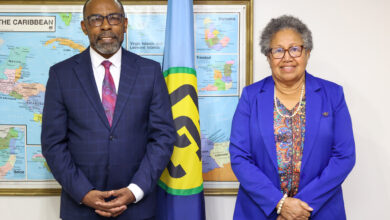Honourable Governor General of St Kitts and Nevis, Prime Minister, Sir George Alleyne, fellow Ministers and Parliamentarians, Ladies and Gentlemen……
On an official visit to Calcutta last year, I visited an AIDS clinic in the city’s largest brothel.
I met there a stunningly beautiful woman who was HIV positive; She’d been working in the music industry on the fringes of Bollywood.
When her HIV status became known she lost her job, couldn’t’ find other work and had to go home to her parents and family in Calcutta.
They, however, were embarrassed by her status – they blamed her for being positive and wouldn’t let her join them for meals or to take part in the normal things families do together.
When she tried once too often to join in family life, they forced her out. They forced her to leave home and she’d ended up as a result in the Sonagachi slum of Calcutta, home to one of the world’s largest brothels.
But that’s Asia, it’s not the UK, and it’s not the Caribbean.
In South Africa in May, I was taken to a project in a township run by the Anglican Church to see some remarkable women who are supporting the township deal with the impact of AIDS.
They support orphans and families who’ve lost loved ones and provide nursing services for the dying.
They took me to one home, a corrugated iron hut just off the main road to meet a woman who’d acquired HIV from her husband who’d already died.
She was so sick, it took her a huge effort just, just to sit upright.
That was Africa though, it’s not the Caribbean and it’s not the UK.
In Britain, we think of the Caribbean and we think of:
– Sun-soaked beaches and palm trees
– Luxurious cocktails
– Ferocious cricketers like the fabulous Courtney Walsh who’s here today, storming down the wicket.
We certainly don’t associate the Caribbean with HIV and AIDS.
But in truth we should. The epidemic in the Caribbean is spreading fast,
An estimated 35,000, but maybe as many as almost 60,000 died last year in this region from AIDS:- adults and children alike.
The Caribbean is the second worst affected region of the world after sub-Saharan Africa
And last year an estimated 52,000 people were newly infected with HIV.
So I pay tribute to the Caribbean Heads of Government who when they met my Prime Minister Tony Blair, in December last year urged the UK to help to arrange a high level event for opinion leaders in the region to examine ways to reduce the stigma and discrimination that is fuelling the spread of AIDS here.
In particular, I pay tribute to Denzil Douglas, Sir George Alleyne and other visionary leaders who’ve drive the plans for this meeting.
I also want to thank Dr Eddie Greene, his organising team, PANCAP and CARICOM staff, who have worked extremely hard to bring together an amazing group of regional political and opinion leaders, local and international experts and representatives of the UN, bilateral and multilateral funding agencies and those representatives of vulnerable groups, in particular those of you who are living with HIV and AIDS,
Other countries have taken these difficult first steps to attaché stigma and discrimination, especially Uganda, Thailand and others, and have made an impact in reducing the spread of HIV.
But there are countries that have ignored the problem in the early stages, and have gone on to regret their neglect.
As politicians and opinion leaders there is always a temptation, isn’t there, to shy away from issues that will be divisive, controversial, or have the hint of scandal.
This is what makes AIDS so difficult, because it brings to the fore issues related to sexuality, to the power relations between men and women, and highlights the needs of groups who are often pushed to the edge of society, such as commercial sex workers, men who have sex with men, and the increasing number of men and women living with HIV and AIDS.
The challenge surely is for us collectively to demonstrate leadership, examining these issues and talking openly to our constituencies, no matter how embarrassing or difficult this may be at first.
We are all the products of our upbringing.
As young children, we learn how to behave, we learn what is normal and acceptable, and each generation very quickly understands how to fit into society.
The problem comes when stigma and discrimination become engrained in our cultures.
When young people are taught fears and prejudices and act on them because they believe that is how they are expected to behave.
British society has suffered from all kinds of class distinction, discrimination and even prejudice, which many people in Britain found very difficult to see.
This was in particular the case in the fifties and sixties, when thousands of Caribbean people came to live in the UK and encountered huge stigma and prejudice.
We know the causes of stigma and discrimination. It’s the fear of those who are different, the feeling that these others are somehow inferior, or a danger: deep seated cultural values that we practice without thinking.
And we know the results of stigma and discrimination: people are made to feel outsiders, excluded, second best.
I think we also know a great deal about how to tackle stigma and discrimination, and this conference will be an important step in achieving that goal.
It is our attitudes, the attitudes of our friends, of our neighbours, the beliefs of our constituents that lead to the discrimination of those who are different.
Impact
If people with HIV don’t feel comfortable to go forward for a test that might allow treatment,
– to start that means more people will become HIV positive
– more people will become ill
– more people won’t be able to work for longer periods of time
If those people work in our public services or in key industries, then AIDS begins to have an impact behind the immediate individual and their family, on the economy, on the health service, the police, the army, teachers and nurses,
We need to know and act on the human costs of stigma quickly, to understand how families are excluded, how they’re deprived of their rights and entitlements because we haven’t challenged discriminatory behaviour.
A key good starting point for our conference is to accept that we, all of us – from whatever country of origin, have a significant role to overcome our cultural tendencies to stigmatise and discriminate.
If we fail to address these issues at the top – at the policy making level – then the end result will be felt by the most vulnerable.
If action is not taken, in the Caribbean we will see: ” more children of people with AIDS bullied or excluded from school, as was the case in Uganda in the early days, ” more young men living with HIV and AIDS who are refused a job or arbitrarily dismissed, as happened in China before the government took action ” more gays and lesbians living in fear, forced to live a double life that places partners and themselves at high risk, as has been seen recently in the USA and UK.
We need to change legislation that legitimises stigma and discrimination and which in turn makes tackling AIDS more difficult, such as the legislation prohibiting sex between men.
Leading celebrities and politicians have made a real positive impact on AIDS in many countries. President Museveni in Uganda, Nelson Mandela in South Africa and internationally as well, Elton John and Bono from U2 in the UK/Ireland.
Individually they have been brave enough to speak out and have given a lead and made a difference.
We need more examples from the Caribbean, like the members of the West Indian Cricket Team such as Brian Lara who have been working hard to raise awareness on AIDS in the region, and the music star Aja who has worked hard to support the AIDS programme in Barbados.
Church groups also have a special responsibility when speaking out on issues around AIDS and sexuality. Although not the intention of the church leaders concerned, messages which only condemn, rather than demonstrate love and acceptance, can be used by those who practice violence. Church groups in much of sub-Saharan African are doing an amazing job in reaching out to those worst affected.
Media
The media have a special responsibility to play in reporting on and reflecting local societies, often including the stigma and prejudice of these societies.
The mass media can be a great force for good, in the prevention of HIV and the control of AIDS, but they can also spread panic and havoc.
Over the next few days, we will hear how the media in many countries have actively helped to reduce stigma and discrimination
I want to thank the members of the media present and invite them also to be “Champions of Change” and to step out of their comfort zone, spearheading new campaigns to reduce stigma and discrimination in the region.
Music industry
The music industry also has a special role to play.
A number of artistes are effectively contributing to the spread of HIV, by producing reggae and rap songs actively encouraging discrimination against those who have AIDS and encouraging violence towards minority groups, such as men who have sex with men. These artistes include Buju Banton, Sizzla Kalonji, and others.
The use of phrases like “Batty Boys” and “Queers” is a cheap effort to gain notoriety and sell records. I believe in free speech, but nobody in a democracy should be able to incite violence against minorities.
This is not just a bit of fun, something to laugh about or trivialise – it goes to the heart of what makes up a society.
I welcome the action taken by serious music artistes, such as John King and the mighty Gaby, who have had the courage to take positive action on behalf of those living with AIDS and do not support those who advocate violence against minority groups.
Britain
Sadly, this same discrimination and violence is still to be found in Britain, despite the efforts of many leaders, musicians and officials.
Earlier this month, a gay man was attacked on the South Bank of the Thames in London, by a mob of young men and women and beaten to death.
Why?……. It was known that he was gay.
If fact, violent crime against gay people has increased by 20% in the UK during the last year, so we have much still to do in our own country.
The close ties between the Caribbean and those in the UK with links here means that there is a link between AIDS in the Caribbean and AIDS in the UK.
Resources
Significant resources are now available for the fight against AIDS. Indeed, resources to tackle AIDS in the region have quadrupled over the last 3 years.
My own government has committed to spend at least £1.5 billion to tackle HIV and AIDS globally over the next 3 years.
But, we will not succeed unless each of us steps up to play our part.
Each of us has a role to play.
Each of us has to become a “Champion for Change”.
Embarrassment is a luxury we can no longer afford. Stigma and discrimination is driving this epidemic in the Caribbean, and none of us, I’m sure, wants to gather here in a few years time, to discuss a further doubling in AIDS cases Ladies and Gentlemen:
– Let’s learn the lessons of Africa,
– Let’s pledge to make a difference here
This is a milestone Conference, it is a genuine privilege to be here with you.
Thank you.




